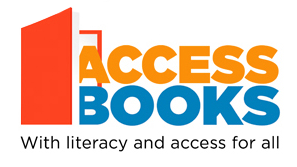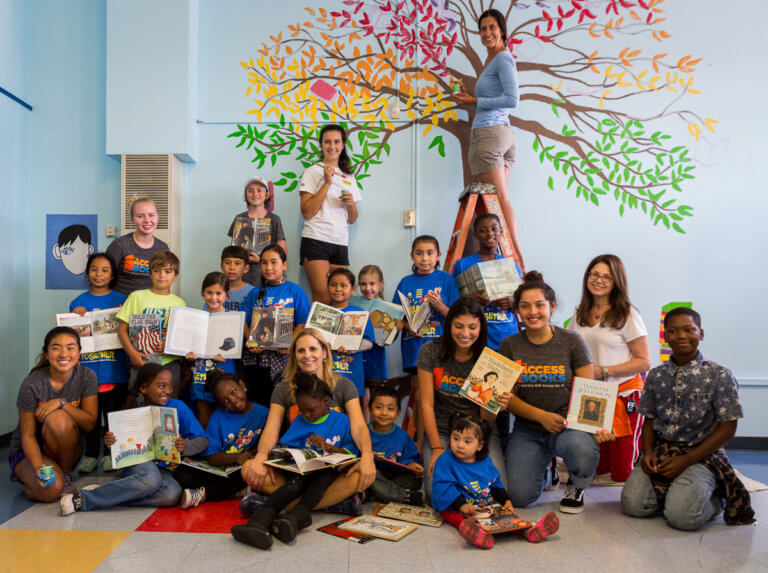There’s lots of pressure—on students, parents, teachers, schools and districts—for students to learn how to read and write and maintain grade-level reading abilities. But not every child has adequate access to books at home, or even in their school libraries, putting some kids at an immediate disadvantage. That’s why Rebecca Constantino founded Access Books in 1999. The Los Angeles-based organization refurbishes the libraries of underfunded public schools—providing not only updated and engaging books but also an inviting space for kids to explore and read. Today, the mostly volunteer-powered team has updated 262 libraries and provided 1,514,270 books to children and schools in need. Access Books Executive Director Rebecca Constantino took some time to share her vision with Rewire and let us hang out while her team refurbished the library at Washington Elementary School in Compton, California. Rewire: How did Access Books get started? Rebecca Constantino: While conducting research for my Ph.D. dissertation, I visited schools in both affluent and poor areas. I found that students in wealthy areas had access to more books in their home than poor children had in their home, classroom, school and public library combined! I also found that in some affluent schools, good quality books were discarded on a regular basis, making room for new ones. Thus, Access Books was born. It started out of my car with one school giving books to another school. Soon, I applied to be a nonprofit so that we could purchase new books for the library. After a few schools, I realized we really need to paint the library and make it welcoming. Rewire: What’s the process for schools to apply for a library makeover? RC: It is all word of mouth. We determine what school is next based on need. It is recommended that schools have 28 books per child. Most schools have about 10, some as few as 5. Also, the books are outdated with average year of publication in the 1970s. We also try to work with principals that we have worked with before. The schools apply online and then we go from there. We try to serve the neediest schools first. Rewire: Typically, what is the condition of school libraries that you rehab? RC: The books are outdated. They have not had a new set of books in years. The actual space is usually a drab brown. It is not welcoming and the books are not inviting. Rewire: Why is it important to revitalize school libraries, and what is the impact beyond murals and new books? RC: Access Books was created to address the great need among inner city and underserved children for reading material. Research indicates that the best predictor of reading ability is access to books and in poverty-ridden areas, the quality of the school library is the best predictor of reading achievement. For the past 25 years in California, school library funding has been ignored, resulting in neglected and rundown libraries. Many schools have books that are outdated (as old as the 1950s), tattered and disinteresting. We have culled from shelves books such as “Taming the Savage Negro” and “When Man Will Go to the Moon.”
Accordingly, children in underserved areas have little, if any access to books in the home or public library, and in some cases wait up to nine months for a popular book. In many affluent areas, children have access to books in the home as well as their school libraries since in-house fundraising can provide for great libraries. This means affluent children gain all the academic benefits of access to books but more importantly, they gain access to the joys that reading and books can bring, while poor children are left without books to read. Rewire: Where does funding come from? RC: Our team’s ability to renovate school libraries relies on grants, donors and volunteers. The individuals and generous organizations who support us are the “steam” that keeps us going. We have only one paid staff member… The core of the labor… is carried out by volunteers. Access Books operates very conservatively, not beginning any projects until we have a partner school determined and necessary funding to address any needs not met by the partner school’s book drive. We have seen a broad spectrum of results from drives and as such, request funding to ensure we meet our goal of 10 quality books per child for each library. Rewire: What advice do you have for people who want to start charitable organizations of their own?
RC: Don’t do it to look good for others or to do a school application. Do it because you really believe in it. We have many who volunteer who do it just to get the volunteer time. They don’t enjoy it and others usually sense that . Just start it and you will find people who want to do the same as you. All change comes with people working together and you will find others who share your passion. Access Books is successful because so many people show up, donate and are involved. The ones that are involved to a high degree enjoy it because it is their passion as well. Read the story on Rewire.
0 Comments
Leave a Reply. |
PressArchives
December 2022
Categories |
We are a registered 501(3)c. Tax ID 31-1655018
Copyright © 2023 Access Books. All Rights Reserved.
Copyright © 2023 Access Books. All Rights Reserved.


 RSS Feed
RSS Feed
